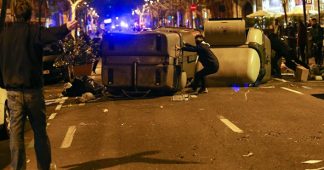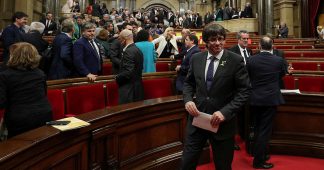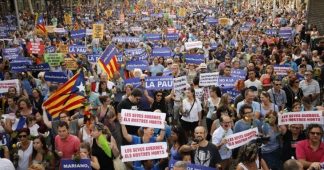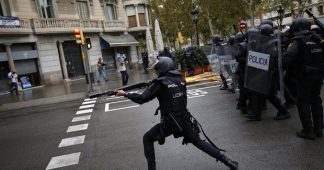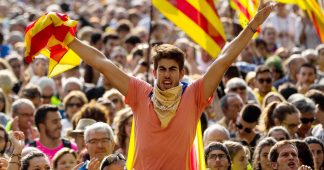By Dick Nichols
April 5, 2018
14-15 April: Act to defend democracy and human rights, in Catalonia and everywhere

The Spanish state’s repression against Catalonia’s democratic rights gets worse every day. There are at this moment 10 leading politicians and activists in prison, without having been condemned of any crime. They are accused of violent rebellion, although they have never used violence. By mid April the two leaders of the main Catalanist organisations, Jordi Cuixart and Jordi Sánchez, will have spent 6 months in prison.
And apart from the 10 political prisoners and 6 political leaders in exile, from 1 October until now there have been: 1,500 people injured while voting or demonstrating; 150 fascist attacks; 140 web sites closed; police attacks on journalists; censorship of rappers, writers and artists…
In protest at this situation, there will be a united demonstration in Barcelona on Sunday 15 April at 11 am, organised by a very broad platform of social movements, including the ANC, Òmnium Cutural, trade unions, the neighbours’ organisations, youth movements, cultural and sporting organisations, the federation of NGOs… It will be a massive call for solidarity with the political prisoners, and with all those suffering the current attacks in Catalonia and increasingly in other parts of the Spanish state.
We call on international solidarity movements to organise actions over the weekend of 14 and 15 April: demonstrations, rallies, public meetings, symbolic events…
If we allow repression to go unchallenged in Catalonia today, then fundamental rights can be repressed tomorrow in any part of the world.
Please mobilise on 14-15 April. Defend democracy and human rights. In Catalonia and everywhere.
Poster available in seven languages here
Week ending April 8

168 nights with political prisoners
Main events, April 2-April 8
Isabel Pires (Bloco de Esquerda – Left Bloc) is one of the Portuguese representatives who have signed a manifesto demanding the release of Catalonia’s political prisoners. For the first time, representatives of the Socialist Party (currently in government) and right-wing parties, such as the Social Democratic Party (PSD), have taken action. Written in the strongest terms, the document says: “We won’t contain our indignation at this frenzy of vindictiveness masquerading as legality, and we add our voice to all those in Europe and the world who call for the immediate freeing of Carles Puigdemont and all Catalan political prisoners.”
The manifesto (which can be read here in Portuguese) will be presented on Friday in the auditorium of the Assembly of the Republic, the national parliament. Just last week, the Portuguese parliament passed a resolution urging that the Catalan problem be resolved through political means. But it is this manifesto that underscores the issue of the prisoners and, as Pires explains, although the government has not yet taken a position, a growing number of voice in Portugal are demanding the release of the prisoners.
Why did you sign the manifesto?
Because we want to defend the freedom of those whom we believe to be political prisoners.
The event will be held in the auditorium of the Assembly of the Republic, the national parliament.
We wanted to do it in the Assembly of the Republic because we believed that it holds symbolic power. Not only because there are representatives from different parties among the signatories, but also because it sends the message that the government should take a clearer position. It is very significant to be able to use the Assembly of the Republic’s auditorium. Ultimately, it is also a way of taking a political stand of sorts.
Five political parties have signed the manifesto. How important is that? Have all parties signed?
All have signed except one, the most right-wing party, which has not signed [the Social Democratic Centre-People’s Party. CDS-PP]. We had never before gotten an MP from the PSD, and now they have signed, too. And the PS representative is important, because the PS, as governing party, is split on this matter. We hope that more people connected to this group will end up taking a stand.
Who is the representative whose joining surprised you the most?
The PSD, a right-wing party, is very important. It was not at all clear that he would end up signing, because it is a party that has a close ties with the Spanish PP. And from this point of view, it is extraordinary.
And the President of the Republic [Marcelo Rebelo de Sousa], what position does he have?
He has never said.
And the prime minister [António Costa]?
The prime minister is holding on to the position that all this is an internal Spanish affair and that, therefore, a statement is not necessary. Last week the government’s Secretary of State expressed this position. For now they remain non-committal.
We spoke two months ago. What changes have there been since then, in Portugal, regarding the Catalan affair?
Although there has been no avalanche of pronouncements about the matter, I believe that, yes, there is a very substantial difference from two months ago. At the moment, unlike what happened after the referendum, there are more and more people, especially people who write opinion articles, academics, teachers, who are committing themselves publicly. The question of the political prisoners has more and more visibility. And this, from the point of view of Portuguese politics, is very important. Portugal experienced a long dictatorship and knows what political prisoners are. For Portuguese society, this idea is very powerful. In Portugal we do not accept that people should be imprisoned for political reasons, and we condemn this.
What pressure can Portugal apply on Spain?
Portugal, like other EU nations, must criticise what has been happening in Spain and the decisions that have been made. And say that the judicial power is being used to stage a political offensive. Therefore, I believe that European states must join together and make public statements rejecting the existence of political prisoners in Catalonia. The countries should address this question. It is not easy, but we will not stop pressuring until this position is reached.
Northern Europe is deciding again on southern Europe.
These things are typical of the EU: cyclically, Germany and France, the countries that rule, are still predominant. And in the case of Germany it is especially important because it can stop, in a way, this process.
Germany, Portugal and Spain. Three countries that lived the transition from a dictatorship to democracy in a very different way. What weight do you assign to the Spanish Transition in order to understand what is happening today?
A parallel with the Portuguese Revolution can be drawn. In Portugal we managed to get rid of the power structures of the dictatorship. In Spain, on the other hand, the transition was negotiated, and the same thing did not happen. In Spain there are still remnants of this Francoist power. And that is the main difference between the two countries: the democratic paths that they followed are different. For example, now Spain is using these laws [sedition and rebellion], which we do not have in Portugal.
Translation: Vilaweb, slightly amended by Green Left Weekly European Bureau
April 4: Barcelona FC CDR members launch yellow balloons at Barça-Roma Champions League match in support of political prisoners. The match also takes place before a banner calling on the Italian authorities to release the refugee rescue vessel Open Arms.
April 4: 1000-strong demonstration in Girona in support of one CDR member charged with cutting the rail line at Girona station during the November 8 general strike.
April 4: AMI and the Catalan Association of Municipalities and Shires (ACM) prepared to join the broad front in defence of Catalonia’s democratic rights being promoted by parliament speaker Roger Torrent.
April 4: Josep Maria Cervera, president of the Association of Municipalities for Independence (AMI) states that “the Puigdemont card has to be played right to the end”.
April 4: Poster for April 7 Madrid demonstration demanding freedom for the Catalan political prisoners.

April 4: Madrid government anounces that is studying a legal appeal to the Constitutional Court against the decision of the Catalan parliament’s speakership panel to accept Carles Puigdemont’s vote.
April 4: PP to present draft law on “multilingual education” to the Catalan parliament.
April 4: After weeks of silence, PSOE leader Pedro Sànchez states that “there is no freedom of expression in Catalonia”, “socialists are suffering violence in Catalonia” and Catalan public channel “TV3 is not an example of plurality of information”. He later meets with representatives of Catalan Civil Society to thanks them for “defending the values of all citizens” and “social harmony among the peoples of Spain”.
Solidarity with Catalonia (Portugal)
Free the Catalan political prisoners!
Statement by signed by Portuguese Members of Parliament from the Left Bloc, Socialist Party, Social-Democratic Party, United Democratic Coalition (Communist Party and Greens) and People Animals Nature as well as numerous social movement activists and intellectuals. The full list of signatories and the Portuguese text can be found here. The statement will be launched on Friday, April 6 in the auditorium of the Portuguese parliament,
The president of the Generalitat [government] of Catalonia, exiled in Belgium five months ago, was arrested last Sunday in Germany in a controversial operation involving the Spanish and German secret services. He was returning from Finland, where he had gone on the invitation of its Parliament.
Carles Puigdemont was re-elected to the Catalan Parliament three months ago, in an election which, contrary to all the expectations of the Spanish government, reinforced a majority favorable to Catalonia’s independence, to the right of the region to decide its future and to the reinstatement of the President of the Generalitat.
In addition to Puigdemont, nine Catalan independence leaders have been pre-emptively detained without bail, eight of them being re-elected in December, including the former Speaker of the Catalan Parliament and the Vice-President of the Generalitat. Four of these prisoners have been held in custody for five months.
Proof of the punitive bent of the Spanish Supreme Court was its refusal to release one of these prisoners, Joaquim Forn, a member of the suspended Catalan government, whose defence lawyers had requested that he be able to await trial in freedom so as to treat tuberculosis he had contracted in jail. Judge Pablo Llarena, author of all these arrest warrants, refused this request on the pretext that the detainee could be treated in prison …
The same judge has proceedings open so far against a total of 22 Catalan political leaders and activists, who are joined by more than a thousand mayors and school principals awaiting rulings on their collaboration in the organisation of the October 1 referendum. He has recently prevented another of the prisoners, the social movement leader Jordi Sànchez, from being able to defend before the Catalan Parliament his candidacy for the presidency of the Generalitat—without any court sentence having withdrawn his political rights. This was the opposite of what the Spanish justice system itself did in 1989, when an ETA prisoner was allowed out of jail to defend his candidacy as leader of the Basque regional government.
On Friday, March 23, the same day as the UN Human Rights Committee called on the Spanish State “as a matter of urgency” to “guarantee all the political rights of Jordi Sànchez” the new pro-independence presidential candidate, Jordi Turull, was arrested in Madrid on the eve of facing a second parliamentary vote.
In addition to Puigdemont, four other members of his government and two independence leaders are in exile in Belgium and Switzerland; the Spanish Government has issued a European arrest warrant against all of them. The last, on Friday, was the Republican leader Marta Rovira who left the country accompanied by her daughter so as not to be prevented from “giving her everything that I can give her”, leaving Catalonia in “deep sadness” at having to part from”so many people that I love” and with whom “I shared so many struggles over so many years with a single goal: to change society, to make it more just.”
Only authoritarian regimes–in the form of harsh democracies or soft dictatorships1— have political prisoners. They alone detain politicians and social movement leaders who have been elected aslegitimate representatives of the people and who have never used political violence to defend their ideals, accusing them of crimes of “rebellion” and “sedition” and thus interpreting as “violence” the exercise of the basic rights to demonstration and expression of opinion.
Spain’s rulers can repeat until they are blue in the face the mantra that Spain is a “consolidated democracy”, but their actions on the Catalan issue all point in the opposite direction. Many European rulers can turn a blind eye and pretend not to understand that—whatever they think of the right to self-determination of the Catalan people—democracy and human rights are what is at stake, in Catalonia and in Spain as a whole!
We, by contrast, won’t contain our indignation at this frenzy of vindictiveness masquerading as legality, and we add our voice to all those in Europe and the world who call for the immediate freeing of Carles Puigdemont and all Catalan political prisoners. Let all political and legal practices that are incompatible with respect for the civil and political rights of Catalan citizens end once and for all and, as everyone has called for, let there be political negotiations over a political problem.
March 27, 2018
Footnote
1. The Portuguese original contains the untranslatable coinages «democraduras» and «dictablandas»–so “harsh democracies” and “soft dictatorships”
April 3: Die Linke MPs interview with Carles Puigdemont (in English)
April 3: Jaume Collboni, PSC leader in Barcelona Council, calls for the road blockades of the CDRs to be stopped.
April 3: PP calls on the Catalan parliament speakership panel to rescind its decision on recognising the vote of Carles Puigdemont. If not done the PP will lodge an appeal with the Constitutional Court. Citizens follows suit. The CUP values the decision “very positively”.
April 3: Spanish interior ministry sacks Annabel Marcos, the principal of the Catalan police academy, after a report on the Spanish-centralist web-based paper El Español that she had transported ballot boxes in her car on October 1.
April 3: The general secretary of Citizens, José Manuel Villegas, says his party will call on the Spanish parliament to declare Catalan pro-independence organisations (the Catalan National Assembly, Òmnium Cultural and the Association of Municipalities for Independence) illegal.
April 3: The speakership panel of the Catalan parliament decides by four to three that the vote of Carles Puigdemont should be recognised by parliament.
April 3: Regional prosecutor of Schleswig-Holstein decides that Spain’s extradition warrant for Carles Puigdemont should go to trial, and asks that the court decide that Puigdemont remain in jail in the interim.
April 3: Barcelona mayoress Ada Colau on Spanish TV program Espejo Público: “The vast majority of protests have been peaceful: it is not true that there has been street violence. Let’s not create unnecessary alarm.”
April 3: Jaume Alonso-Cuevillas (Puigdemont’s defence lawyer): “We don’t live in a democracy, we live in a partyocracy where the parties are in permanent competition. Judges shouldn’t take that into account, but they are human and take into account the environment they live in.” Also: “It’s logical that I say there was no crime of rebellion, but all Spanish professors of law of all tendencies say it as well.”
April 3: CDR of Barcelona FC asks members to bring yellow balloons to tomorrow’s Champions League match against Rome, to be inflated and released 17 minutes and 14 seconds into the game to shouts of “independence and freedom”.
April 3: Clara (CDR member interviewed on Catalonia Radio): “They are creating a narrative to criminalise us and we are preparing our legal response.” Also: “There have been plants in the CDRs ever since October 1, and we are identifying those who have been infiltrated.”
Comment (Javier Pérez Royo, Ara, April 3)
What can we expect from the European judge?
The decision—rather, the decisions—will be formally national, but de facto European: it is impossible for Europe to agree with Spain’s top judicial bodies in their definition of the crime of rebellion
From a formal viewpoint, there are four jurisdictional bodies from four European countries that need to rule on the European arrest warrant issued by Spanish judge Pablo Llarena. Each one is expected to issue a ruling on a single, individual case, except for the Belgian judge, who will do so on two cases. Therefore, we cannot speak of a single “European judge” who is expected to reach a decision, as the title of this article would suggest.
Nevertheless, while there isn’t a single European judge as such, I believe that de facto there is. Each and every one of the judges will decide on their own. But every one of them knows that the individual cases that they are expected to decide on are all linked by a common thread. And all of them realise that this affair has taken centre stage as far as Europe’s public opinion is concerned, as a browse through the papers will easily confirm. And it is not just Europe’s public opinion: recall the recent NYT editorial.
There are times when a decision by one nation’s jurisdictional body becomes a reference for the others. The case of the Canadian Supreme Court’s opinion on Quebec springs to mind. Even though it was not a ruling —it was not prompted by a court case, but by a formal enquiry from the federal government— and, therefore, it did not set a trial precedent, this opinion has become the single most influential piece of doctrine on what the right to self-determination is —and what it is not—, as well as on the conditions under which a secession referendum may be held within a democratic country.
The cases on which the German, Swiss, Belgian and Scottish judges must rule are formally separate and individual, but there is a shared link: what constitutes a crime of rebellion in a democratic European country well into the 21st century?
That is the question that must be answered by the four jurisdictional bodies of the four nations where the Catalan nationalist politicians are held and against whom the European warrant has been issued. And all four judges know that their answer will establish a European common denominator on the subject of rebellion crimes. Even if they do it in their own individual way, together they will decide what a crime of rebellion is and what it is not; what sort of “violence” is required for an event to be characterised as a crime of rebellion.
Make no mistake: the decision —rather, the decisions— will be formally national, but de facto European. Rather than four individual decisions, we will see four concurrent votes on a single decision. All of them will seek the European common denominator, something that can be objectively and reasonably justified in front of Europe’s public opinion.
At any rate, that European common denominator could never be the content of the brief or the warrant issued by Justice Llarena. On the subject of the crime of rebellion, all four judges will dismiss the arrest warrant. They will not allow the Catalan politicians to be tried for rebellion in Spain because it is impossible for the European judges to make that sort of collective decision. And they know that they cannot make contradictory decisions.
Spain’s Public Prosecutor, Audiencia Nacional and Supreme Court have been playing with fire and they will get their fingers burnt. It is impossible for Europe to agree with Spain’s top judicial bodies in their definition of the crime of rebellion in the case of the Catalan nationalist politicians. Some voices in media and academia have taken for granted that, following Carles Puigdemont’s arrest in Germany, the Catalan leader would be handed over to the Spanish authorities under the terms that Justice Llarena has laid out. It is not going to happen. All that Spain’s justice will achieve is to see its prestige in Europe eroded even further.
April 2: University of St Andrews’ students turn out to demonstrate support for Clara Ponsati despite rotten weather.
April 2 (from March 29): Interviewed in the Diari de Girona, British writer John Carlin says that “[Supreme Court judge Pablo] Llarena is the one that should be locked up in jail”.
April 2: Assembly of Workers in Defence of Catalan Institutions (ADIC) calls on European citizens and institutions to support Catalonia’s democratic rights.
April 2: Xavier Domènech (CatECP) clarifies position on CDRs after complaints on social networks over his interview in yesterday’s La Vanguardia in which he said that he didn’t support their actions that lead to violence: “Badly expressed on my part: no criminalisation of citizen protest.”
April 2: Albert Rivera (Citizens) says that the CDRs are “separatist commandos”.
April 2: PSOE federal secretary Pedro Sánchez (after total silence on Catalonia for weeks): “I am very worried about the violence in Catalonia.”
April 2: PSC spokesperson Salvador Illa: “The insurrection of the CDRs could lead to civil confrontation in Catalonia.”
April 2: Estremera prison official José Angel Hidalgo asked to explain to his superiors the reasons for this article in the web-based magazine CTXT, in which he criticises the jailing of Catalan politicians.
April 2: ERC spokeperson Sergi Sabrià says the PSC will have to break with article 155 if it wants to reach agreements with the ERC.
April 2: Javier Maroto (PP spokeperson: “The CDR recall the kale borroka” and “the Mossos d’Esquadra (the Catalan police] are not doing enough to stop disturbances.”
April 2: Aitor Esteban (Basque Nationalist Party) says that the Catalan leaders “have to get their act together” and form a government, so as to enable the lifting of article 155.
Week ending April 1

166 nights with political prisoners
Main events, March 26-April 1
April 1: (El Nacional) The Catalan case bursts onto the European stage (no more an internal matter)
April 1: (El Nacional) German think tank warns over consequences of extradition
April 1: On the Basque Day of the Land (Aberri Eguna), the left independentist forces (izquierda abertzale)–celebrating in Iruñea (Pamplona)–call for both Basque and Catalan independence from the repressive Spanish state. In Bilbo (Bilbao), Basque Nationalist Party (PNB) leaders reaffirm their refusal to support the Spanish state budget until article 155 intervention in Catalonia is lifted.
April 1: CDRs continue wave of actions, removing tollway barriers on three expressways (see below, for action on AP-7 near El Vendrell).

April 1: Two Die Linke (The Left) MPs, Diether Dehm and Zaklin Nastic, visit Puigdemont in Neumünster jail. They offer him a house in Germany in case he is released while awaiting trial and call on the German government not to side with its Spanish counterpart.
April 1: Puigdemont: “October 1 was the beginning of another epoch from which there is no turning back.”
April 1: Former Catalan president Artur Mas advises against investing Carles Puigdemont as president, even though it would be totally legitimate, because it would open others to legal reprisals: “It has to be seen whether that is worth the trouble … or whether it is better to strengthen our forces and move forward.”
April 1: Jordi Sànchez from prison: “Six months ago today the democracy, non-violent resistance, civil behaviour and determination of the people triumphed.”
April 1: ERC leader Pere Aragonés restates the need for dialogue with the Spanish state.
Background (Ara, March 28)
Der Spiegel calls for asylum for Puigdemont
Most German newspapers oppose extradition of Catalan president
While the Territorial Court of Schleswig-Holstein decides whether or not to extradite Carles Puigdemont, a good deal of the German press is calling for the President to not be handed over to the Spanish authorities. In an editorial titled “Asylum for Puigdemont”, Jakob Augstein —an influential journalist and co-owner of Der Spiegel— calls for the Catalan leader to not be extradited. Augstein writes that “The detention of Puigdemont is an embarrassment. For Spain. For Europe. For Germany.” And he also reminds readers about the arrest of another Catalan president, Lluís Companys: “The Germans already handed over one Catalan politician to the Spanish. Lluís Companys declared independence in 1934. He was arrested and tried. After the victory of the leftist forces he was freed, fought against Franco, escaped to France, and was captured there by the Gestapo and sent back to Spain. He was executed on October 15, 1940.”
“Rebellion is a crime that requires the use of force under Spanish law, but violence has never been spoken of in Catalonia. At least not by the Catalan side. It was the Spanish police who attacked the Catalans last fall when they wanted to vote in a referendum”, reflects Augstein. And he adds: “The Spanish are calling for the extradition of Puigdemont. Germany must reject this. A politician who uses peaceful means to fight for his objectives should not have to go to prison.”
Germany’s Süddeutsche Zeitung has taken the same line as Der Spiegel and questions the fact that Puigdemont stands accused of rebellion. It also warns that under no circumstances can possible political motives behind a case be ignored. It argues that judges must turn down the extradition request because “it is not the instrument to resolve internal conflicts”.
The Frankfurter Allgemeine is much more neutral but does not take a position in favor of extradition. It describes the situation and stresses that the German government has always said that the Catalan conflict must be resolved “within the Spanish legal and constitutional order.”
Translation: Ara
March 31: The state prosecutor of Schleswig-Holstein to decide by Tuesday, April 3 if Puigdemont has a case of extradition to answer to.
March 31: ANC plants 3000 yellow crosses on the beaches of Cadaqués, Port de la Selva (Alt Emporda) and Argelers (North Catalonia, in France) to remember political prisoners and exiles.
March 31: Puigdemont on his Twitter account. “So everyone is clear: I will not give in, I will not resign and I will not retreat in the face of the illegitimate behaviour of those who lost at the ballot box nor in the face of the arbitrary action of those who are prepared to pay the price of sacrificing the rule of law and justice for the ‘unity of the fatherland’.”
Comment (Suso de Toro1, el diario, March 28)
Puigdemont is our president too2

In the middle of a Spanish National Radio (RNE) broadcast from Valladolid3 in front of a live audience the presenter announces the news of President Puigdemont’s arrest by the German police at the request of the Spanish prosecutor, i.e., of the Spanish government.
Immediate reaction of the audience—applause. But surely not all the audience: some would have been people who instead of feeling jubilant would have been cringeing at news announcing something deplorable, a politician pursued by the police on the orders of the corrupt government of M. Rajoy4. It may even have been that some people who instinctively joined in the applause later felt ashamed.
Surely so, but what a sinister reaction from that audience, which could have been any audience that follows the RNE in many other cities of Spain. A reaction typical of volunteer jailers: the hatred implanted by Spanish politics and media towards the rulers of Catalonia and the more than two million who voted for them has degraded people and social life to a degree not known for forty years. And that corresponds to the image the Kingdom of Spain has re-acquired, of a repressive country where political differences are solved with police and prisons, a country from which dissidents either flee or end up in jail.
These are the striking results of an implacable plan drawn up from the very moment M. Rajoy arrived at the Moncloa5, transported there by all the bank-owned media of the monarchy. They immediately “took over” Spanish public televison (TVE) and this was indicative of what they were going to do elsewhere. To apply their program of theft of social rights and looting of the state they needed to end freedom of expression–they already had the newspapers and television stations on side–and so they drafted the Gag Law6.
Over the years since then they have been administering successive but regular doses of Francoism, doses so small that they have gone almost unnoticed, imperceptibly intoxicating us: as we swallowed they took away everything, the welfare state and freedom. We went along accepting what they did to others by identifying with the flag (the Borbon flag) and a hymn (the Borbon military march) and a “unity” that meant persecution (“Go, get ‘em!”7) of those who would not submit. We got a little more Francoist every day as we laughed at the Catalans who got bashed up for wanting freedom, made jokes about the prisoners8, turning ourselves every day a little bit more into the jailers of the free. They have been vaccinating us against freedom to the point that we are scandalised that there are people who want to vote about whatever they want to vote about. Here freedom is something quite forgotten or unknown.
However, brainwashing and police repression were not enough: they also needed the judges and so carried out a reform of the legal system that not only withdrew legal protection and rights from individuals but also transformed the legal system as a separate power into a repressive instrument of the executive power. In addition to unblushingly placing openly Francoist judges into positions of power—thus controlling the National Court (Audiencia Nacional9) and the Supreme Court—in 2015 they adopted the law reforming the operation of the Constitutional Court. That reform implied reform of the entire state, the cancellation in practice of the legislative branch. On the pretext of carrying out an express reform to prosecute the then-president of the Catalan government, they transformed the Constitutional Court into a reactionary instrument with unfettered power to carry out its repressive function10.
The People’s Party (PP) of M. Rajoy, after its Spain-wide campaign of collection of signatures against the Statute “of the Catalans”, filed a complaint with the Constitutional Court and maneuvered so that the composition of that court would accord with their interests. Thus the judges appointed by the PP challenged a colleague, Pablo Pérez Tremps11. And so a court in agreement with the PP issued a ruling that was far more important than the offense and the damage it inflicted on the Catalans. In fact, that ruling not only expelled Catalanism12 from the consensus on which the Constitution had been built, but also represented, I believe, a real refounding of the judicial system born of the Transition13.
A statute that had been drafted and approved by the Catalan parliament, trimmed back, given a brush14, approved by the Spanish parliament and then approved in a referendum by the Catalan people was changed by the Constitutional Court. The Catalans are today governed by a legal text that is no such thing. The statute that the parliaments and they themselves approved was not accepted by the Constitutional Court, which replaced it with another text, the original reworked with cuts. I won’t go now into the fact that court took out its frustration by cutting out points recognised in other statutes15: once the cutting and polishing began it was back to zero. It’s not just a question of the suspension of the judicial framework in which the Catalans have been left since then, but also of the establishment of two principles: the Constitutional Court can interpret and modify any statutory text and it is not parliaments, the legislature, that establishes the law but the Constitutional Court, which stands above it. Thus, the Kingdom of Spain is no longer a full parliamentary system as commonly understood. But these things, so serious that they seem incredible, are much better known to Professor Javier Pérez Royo16.
For years it has been hard for me to believe the things that I have been writing about here: we were just not prepared to imagine this Francoist degeneration of Spanish public life. However, as regards hatred of the Catalans, yes, I believe everything. Just as I believe that everything that has been happening for months now has been a plan executed implacably step by step: from the Constitutional Court sentence they have been cornering the Catalans, giving them no respite, no negotiation, no way out, taking them to where they now have them—against the wall in a prison state.
When President Tarradellas returned from exile17, bringing back the Generalitat, the Catalan republican institution of self-government, he did it on the promise of Adolfo Suarez and the previous king18 that it would get recognition and fit into the constitution that was about to be drafted. But Suarez was pushed aside by the King himself and the Army, Suárez’s democratic cheque account was left without funds, and now the Generalitat and its legitimate president (since no other has yet been elected) is in exile detained by the German police at the request of the government of M. Rajoy.
Moreover, none of this could have happened without a PSOE committed to the state strategy carried out by M. Rajoy and Felipe VI.
I shall not go on, I only recall what we have been saying for some time, it is not a question of independent republic or a Spanish kingdom, but of democracy or not. And in Spain that “not” means Francoism. Puigdemont is the president of the Catalans, no matter how much it galls M. Rajoy and Felipe of Borbon, but he is a democrat and it is our duty to defend his freedom.
Footnotes
1. Galician writer Suso de Toro, a long-standing supporter of the Catalan right to self-determination, is the author of Another Idea of Spain and various novels. He won the National Prize for Narrative in 2013.
2. “Puigdemont, our president” is a chant that’s heard at any demonstration for Catalan rights against the repression of the Spanish state. Suso de Toro’s point is that he is the president of any Spanish democrat as well.
3. Capital of Valladolid province and seat of the regional government of Castilla y León.
4. “M. Rajoy” was how the name of Spanish prime minister Mariano Rajoy appeared in the payments column of the PP accounts of former treasurer Luís Bárcenas, presently on trial for corruption.
5. Spanish prime minister’s residence and official seat of the Spanish government.
6. The Gag Law, whose official name is Law of Citizen Safety, has been in force since July 1, 2015. Its provisions cover 44 offences ranging from flashing laser beams at aircraft to organising unauthorised demonstration.
7. “Go get ‘em” (a por ellos) was the chant of Spanish-centralist demonstrators gathered outside Civil Guard barracks to send off Civil Guards going to Catalonia to stop the October 1 referendum.
8. For example, members of the Spanish National Police were recorded making offensive remarks about Catalan vice-president Oriol Junqueras on his being sent into detention.
9. The National Court descends from the Franco-era Court of Public Order . More detail here.
10. The Law governing the Constitucional Court was amended in October 2015 to give it powers to punish those judged to have disobeyed its rulings. The former president of the Catalan government mentioned is Artur Mas
11. Pablo Pérez Tremps, member of the “progressive sector” of the Spanish judiciary, is an expert in relations between the legal and constitutional branches of the Spanish justice system who was also a member of the Constitutional Court. During the appeal of the PP against the constitutionality of the Catalan Statute, his impartiality was questioned by lawyers for the PP case: their submission against his sitting on the case was carried six to five by at a full bench session of the Constitutional Court.
12. “Catalanism” is a broad concept that basically means recognition and affirmation of the value of Catalan society, language, culture and institutions. It can apply to supporters of independence as well as those seeking a different relation between Catalonia and the Spanish state.
13. That is, the transition from the Franco dictatorship.
14. The Statute as first adopted by the Catalan parliament was later “given a brush” (cepillado)—expression of PSOE leader and Spanish centralist Alfonso Guerra—by the Spanish parliament.
15. The Spanish solicitor-general idenified 85 articles in the Catalan Statute challenged by the PP that were already contained in other Statutes. Articles finally ruled unconstitutional by the court were already in operation in Andalusia and the Valencian Country.
16. As outlined in his book The Impossible Constitutional Reform. See various comment by Pérez Royo on this blog here, here and here.
17. In 1977, Josep Tarradellas, president of the Catalan government (Generalitat) in exile, returned to Spain where he negotiated with Spanish rpime minister Adolfo Suarez the re-establishment of the Generalitat as the legitimate government of Cataloonia.
18. King Juan Carlos, father of the present incumbent.
March 30: Report on yesterday’s session in the Portuguese parliament (below: Left Bloc MPs wearing yellow ribbon of solidarity with Catalan political prisoners)

A resolution moved by the Communist Party of Portugal (PCP) demanding a “political solution” to the national question in the Spanish state based on “respect for the will of its peoples and hence the Catalan people” is carried with the support of the Socialist Party (PS), Left Bloc, PCP, Greens and animal rights party. The Social Democratic Party (PSD) and the Social Democratic Centre-People’s Party (CDS-PP) vote against.
A second point in the PCP resolution condemning the “repressive measures” and “authoritarian turn of the Spanish authorities” is defeated when the SP vote against, but with 21 of its 86 MPs still supporting the motion and 8 abstaining.
A separate resolution by the Left Bloc condemning the Spanish state’s “shows of violence” and expressing solidarity with the prisoners and exiles, and demanding their release and freedom to return is also defeated by the PS, PDS and CSD-PP bloc, even though 12 PS MPs abstain.
March 30: Trouble getting the story straight: the European arrest warrant issued by Supreme Court judge Llarena says that the Puigdemont government misappropriated €1.6 million in public funds to carry out referendu, while the Spanish government has conceded that no public moneys were spent on the referendum.
March 30: PDECat tables written question in Spanish parliament as to the legal basis of the tracking of Carles Puigdemont by 12 secret service agents.
March 30: Der Spiegel : German government will not overrule decision of the court of Schleswig-Holstein on whether or not to extradite Puigdemont.
March 30: JxCat: “Any other candidate for president than Carles Puigdemont will be provisional.”
March 30: Wolfgang Schäuble, speaker of the Bundestag, says that the Puigdemont case “is by no means trivial”.
Comment (Milan Kučan1, El Nacional, March 30)
The EU’s silence on Catalonia


Spain’s European arrest warrants, arrests, threats of drastic prison sentences and the extension of imprisonment for Catalonia’s elected representatives all indicate that Spain has given up the possibility of tackling the Catalan crisis, which is eminently political, through political means. Spain has opted for violence and repression in the hope that it will succeed in preventing the Catalans from politically deciding their future. Their attempt to pass the complex political issue into the field of criminal law, unfortunately, necessarily leads to gross violations of political freedoms and interference with the dignity of the Catalans, who are also EU citizens.
As a result of the agreement on cooperation in criminal matters, now EU members have become an instrument of Spanish persecution of legitimate political considerations and their institutions. The crisis in Catalonia, with the arrest of the former President of the Catalan Government, Carles Puigdemont, thus reaches even more worrying dimensions. The EU’s silence is therefore unclear. Fear of potential similar ambitions in different parts of Europe cannot be a reason for this blindfolding, let alone accepting undemocratic government practices.
Fear is not a good counsellor. The EU needs the reputation and faith of Europeans not to veer from its democratic foundations and values. That is why it is time for the EU’s appeal to the Spanish government to resolve Catalonia’s problem through dialogue and democratic, political means. After all, the Universal Declaration of Human Rights, which advocates the freedom of thought and expression, will be 70 years old this December.
Footnote
1. Milan Kučan was the first president of Slovenia (1991-2002)
March 29: Tweet of Gilles Simeoni, Executive President of the Council of Corsica: “Following the arrest of Carles Puigdemont, the Corsican Assembly votes, with obviously favorable opinion of the Executive Council of Corsica, a motion of support and solidarity with imprisoned Catalan leaders.” The Council motion also demands the involvement of the EU in negotiations to address the conflict.
March 29: Organisers of the Barcelona World Race suspend the 2019 edition because of the “unstable political conjuncture”.
March 29: Poster (below) for March 31 demonstration in Munich against deportation of Puigdemont, called jointly by ANC Munich and CDR Munich.

March 29: Crowdfunding site for contributions to the legal costs of Carles Puigdemont and other exiled MPs set up here.
March 29: Article in Handelsblatt Global: “Why Germany Could Save Carles Puigdemont”
March 29: Survey by German daily Die Welt says 51% of those surveyed think Puigdemont should not be extradited, with 35% in favour and the rest undecided.
March 29: UK Guardian article says European powers-that-be still unmoved by conflict over arrest of Catalan MPs
March 29: Xavier Domènech (CatECP) repeats his proposal for a government made up of non-party progressives (“let the parties take a step backwards so that the country can take a step forwards”).
March 29: Front cover, The National.

March 28: Spanish daily El Mundo runs lead story based on Civil Guard report of alleged protester violence on October 1. Alleges that a protester kicked a defenceless Civil Guard in the back of the head in the town of Sant Esteve de les Roures. No town of this name exists in Catalonia…
March 28: Newly formed broad platform of union confederations and social movement organisations calls mass protest for Sunday, April 15, calling for release of political prisoners, lifting of article 155 intervention and social harmony between diferent communities living in Catalonia.
March 28: Ultra-right Spanish unionist party Vox, the “popular prosecution” [see explanation here] in the Supreme Court hearings against the Catalan leaders, demands that former premier Artur Mas and Neus Lloveras, the former president of the Association of Municipalities for Independence (AMI), be also charged with rebellion and embezzlement.
March 28: Over 50 Flemish MPs sign letter to Spanish PM Mariano Rajoy demanding that he open a dialogue with Catalan authorities.
March 28: Puigdemont’s German defence lawyer says he will immediately appeal to the German Constitutional Court if the Catalan president is not released by local court considering the European arrest warrant against him.
March 28: Historian Josep Lluís Alay, travelling with Carles Puigdemont at the time of his arrest, himself arrested on return to Catalonia.
March 28: José Ángel Hidalgo, public servant with the Madrid prisons department, summoned to explain his interview on Catalan radio RAC1 in which he questioned why Catalan MPs were in prison.
March 28: 27 judges from 12 of the Spanish State’s 17 autonomous communities (states) declare their solidarity with Supreme Court judge Pablo Llarena. No judge from Catalonia signs the declaration.
March 28: Citizens MP to Catalan Ombudsman: “You are the Ombudsman of the independence process.”
March 28: Der Spiegel calls for asylum for Puigdemont. See Ara‘s account (in English) here.
March 28: Catalan parliament adopts resolutions on: the rights of elected representatives to stand for elected office, specifically the right of Carles Puigdemont, Jordi Sànchez and Jordi Turull to stand for the position of president; the release of jailed MPs and social movement leaders; the suspension of the article 155 intervention of the Spanish government in Catalonia; and the need for broad alliances as the basis for Catalonia’s advance to self-determination. (Translated text of resolutions to come.)
March 28 session of Catalan Parliament: yellow ribbons mark seats of jailed and exiled MPs

March 28: Clara Ponsatí raises nearly £200,000 in less than a day through crowdfunding appeal for her legal expenses.
March 28: Catalan Ombudsman presents his report on October 1 to the Catalan parliament.
March 28: Four well-known writers denounce the detention of Catalan leaders in today’s edition of Le Monde.
March 28: Clara Ponsatí released on bail in Edinburgh, and has to surrender passport.
March 28: Parliament approves the resolution of CatECP on the need to defend Catalonia’s institutions and advance on the basis of broad social majorities.
March 28: A judge in Cornellà (outer Barcelona) charges eight senior Catalan police with sedition and refers the case to the National High Court (Audiencia Nacional).
March 28: Spanish National Police arrest at Barcelona airport the two Catalan police who were accompanying Puigdemont on his journey from Finland to Belgium.
March 28: Parliament rejects the resolution of PSC on “dialogue and reconciliation”.
March 28: Enric Millo, delegate of the Spanish government in Catalonia, says that Catalan parliament speaker Roger Torrent is following the same course as his predecessor, Carme Forcadell (now in jail).
March 28: Elisenda Paluzie, the new president of the ANC, calls on parlament to invest Puigdemont as president.
March 28: Parlament rejects the resolution of Citizens demanding the resignation of Roger Torrent as speaker.
March 28: The New York Times publishes this editorial (“The Catalonia Dispute Ensnares Germany”)
March 28: José Ángel Hidalgo, prison officer at Madrid’s Estremera prison, on radio RAC1: “Junqueras and Forn are fine, they are receiving extraordinary treatment from the prison officers. But the question is, what are they doing here.”
March 28: Education minister Clara Ponsatí presents herself at Edinburgh police headquarters, so as to answer to European arrest warrant issued by Spanish Supreme Court.
March 28: JxCat decides that if Suprme Court judge Pablo Llarena ignores the position of the UN in support of the right of parliamentarians to stand for any position they will present a fourth candidate for the position of president (after Puigdemont, Sànchez and Turull).
March 28: Spanish government spokesperson Iñigo Méndez de Vigo says after meeting of cabinet that “breaking the law is an issue of European importance”.












